Come get in touch... with your wild side!
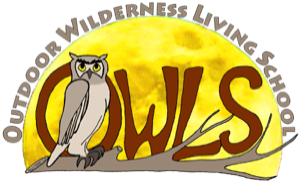
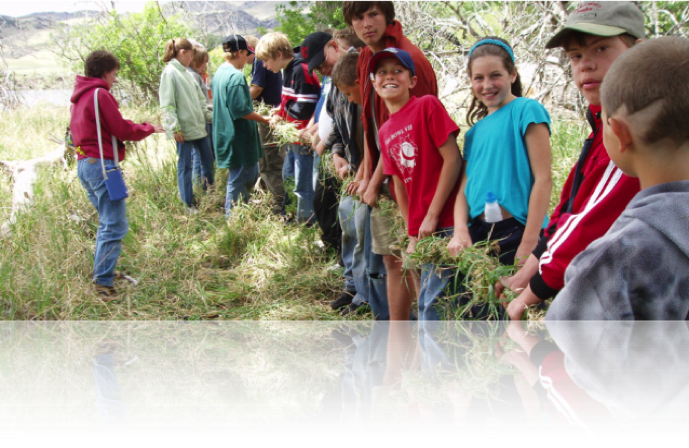
Comments from Kids
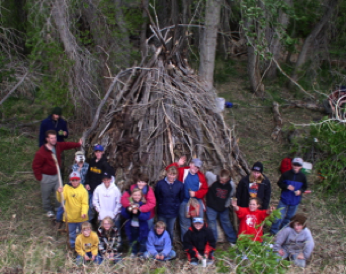
“Before I went on the campout, I did not take the time to enjoy all of the experiences that are out there. I would walk to the bus each morning with my headphones in my ears, ignoring all of the natural music around me. The birds sang their songs each and every morning, and I ignored their exquisite music. Now, when I walk to the bus in the morning, I try to listen to each and every song that the birds have to offer. I slow my pace as I indulge the sound of the songs. I allow myself to ‘stop and smell the roses’ when I stroll along the twisting, winding road to the bus.” --Michaela J.
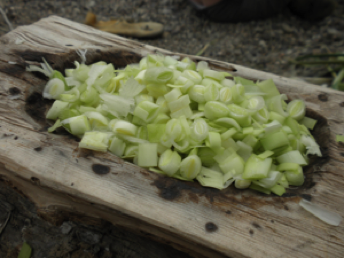
“I learned how to identify edible plants and where to find them. I can make tea out of yarrow, a salad from cattails, or a stir-fry using hot rocks. I know how to make a plate out of cattail leaves by weaving or how to make a bowl using hot coals and a hollow weed. On the campout, I learned how to make fire using only some shoelace, a knife, a curved stick or small branch, a dried cottonwood root, and a piece of cottonwood bark to make a bowdrill.”
--Spencer O.
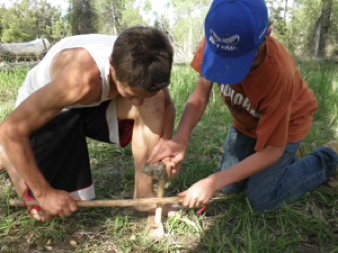
“The bowdrill is one of the best ways to make a fire. It takes teamwork and passion. When my group was making fire, Britt was working the bow, then she said, ‘Help!” I grabbed the other end of the bow and helped her through it. We were the first group done because of the teamwork we did.” --John E.
“My most meaningful experience was being able to work together to start a fire with the bow and drill. The campout taught all of us that we had to work together or you wouldn’t get anything done.” --Gabie A.
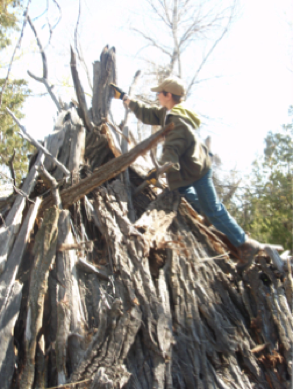
“We made our spindle, our bow, our handhold, and our fireboard. Then, we started to try to make a fire. We were moving the bow as fast as we could. Then the spindle came off of the fireboard. We put it back and tried again and again. Then, the next time we tried it, our bow broke. We had to go find a new bow. After we found a new bow it started to rain. We moved under a juniper tree. Then we got a coal. We tried to move it to our tinder bundle, but we moved too fast, and it fell on the ground and went out. Then, it had stopped raining. We moved out from under the tree. We tried and tried. Everyone was about to give up. Then we got a coal. We moved it to the tinder bundle (more slowly this time). We started blowing and then it lit.” --Zane V.
“Friendship and teamwork are priorities above all others. Without these I would have never been able to start a fire, find Kris, or even fix the wickiup. You need friends and partners to survive in the real world, and without them, we are lost.” --Jon S.
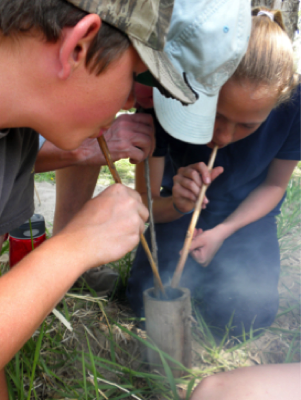
“I think our Indian ancestors were awesome because they lived how we did, but we only stayed three days. I think it is amazing how they lived, and when they killed something, they used everything off of the dead animal. It is also fascinating that they used everything that they found or killed. The coolest thing was all the cooking utensils and how they used fire and coals to cook.” --Brett P.
“I want to go outdoors way more than I did before we went to the campout. I love the outdoors. I love the morel mushrooms. The food was all very good. I loved the campout. I hope we get to stay longer next year.” –Hailey H.
“I don’t like mushrooms. I never have. I tried my best not to show it in front of my classmates, so they wouldn’t be disappointed in my reaction. To tell you the truth, I probably eat way too much, so having those three days of hunger was actually great. Seeing as though people in Africa were starving, I finally understood what it was to be hungry.”
–Chas B.
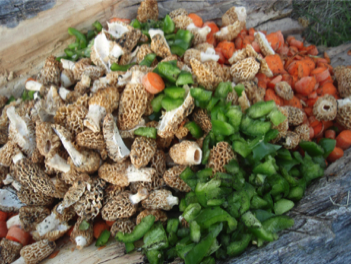
“I learned that there are plants that are good for you and plants that can help your wounds. I was able to experience what our ancestors went through. When we were there, we were able to walk barefoot or with moccasins. We could feel what they felt when they walked, like when you stub your toe or step on a stick. We felt all the pain that they felt. But the one thing that we did have that they didn’t was bandages. They had to find plants they could use that wouldn’t harm their bodies.”
–Gabie A.
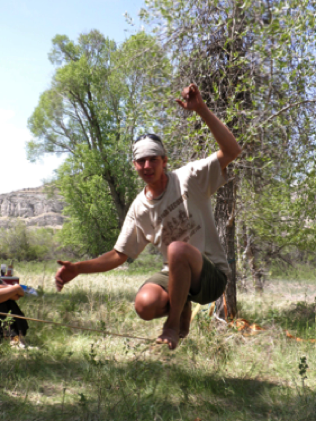
“I liked the games we played. They were very fun. We played a game called Stalking. You had to try to get the candy, and if you are loud and the person with the blindfold points to you, then you are out for that round.” –Hailey H.
“My most meaningful experiences were Wolves and Deer and the Stalking Game. These were meaningful because they are games that everyone was involved in. We were having fun and enjoying ourselves. Wolves and Deer was meaningful because it involved paying attention and being knowledgeable. The Stalking Game was meaningful because we had to be quiet and know the placement of our feet. I enjoyed this because when I got out, it was very fun watching everybody else try to get the bag of candy.” –Colton C.
“I felt everything I stepped on as I walked in the all-leather moccasins… Stalking to get that candy was so intense. It shows how patient you have to be to get your food in the woods. From the birds chirping to Koby running through the trees, all the natural sounds really made me open my ears and listen.” –Alecia P.
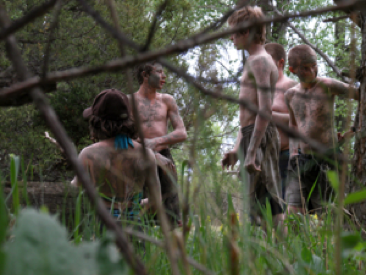
“When I go out for hikes, go hunting, or just walks, I have learned how to observe nature. When I walk, or when I am in a hurry, I can go through the woods and be very quiet.” –Colton C.
“I liked stalking the eighth graders because it was showing who was better and quieter. It was painful, stepping on sharp thorns and getting on our hand and knees crawling in the dirt. We had to crawl in a ditch and be very quiet. We had to keep away from the eighth graders. Then, when Tom said, ‘Get them!’ we all got up and ran at them. Running through the bushes and jumping logs, we went after them all.” –Tristan M.
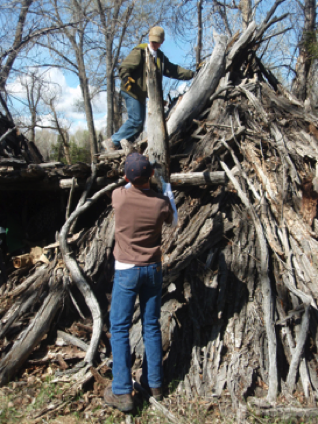
“I had to climb on top of the wickiup and get massive portions of logs and bark thrown up to me. It showed me that I could trust my peers, and that they could trust me. It also showed that I should be thankful for the people in the years before us. I am thankful they didn’t just throw the wickiup together like it was nothing. If they would have, I could have known, because I was putting all of my weight down on the wickiup and didn’t even come close to falling in. I am glad that people put their hearts into the campout to make sure that others enjoy it as much, or even more, than they did.” --Jon S.
“I saw my friends and classmates in a new way. They acted much more caring and considerate. We never talked about who saw that movie and if it was good or not. We talked about what remarkable event had taken place during the day, and I personally liked that better.” --Taya D.
“When I slept in the wickiup, it truly felt like I was in a different place, a place in the early days where this was all Indian land. It all changed me in such a way that I felt like I was closer to nature than I have ever been.” –Tristan M.
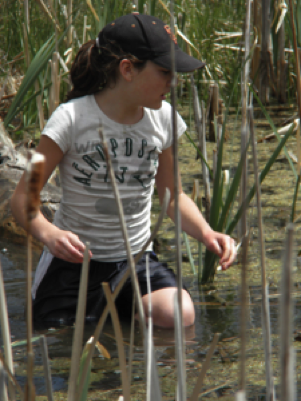
“It has always seemed to me that nature is like a piece of artwork, fragile, but only to be admired through the gentlest of hands. We go walking on a weather-beaten path that so many have followed, but never step off to travel farther into the heart of the forest. I now know what it is like to go into the depths of the forest, experiencing the full force of the wild. Nature is not a picture. It is much more than that.” --Chas B.
“Another meaningful experience was when we went on a morning wildlife walk. This time, I could hear the animals waking up. That morning was very peaceful. I felt proud that I was on this walk seeing animals, not disrupting them, and making my way through the great outdoors.” –Taya D.
“The life we lived out there for three days is what our ancestors’ lives were like year-round. I see that my ancestors routinely did what I struggled to do once. It makes you stop and think about how technology has changed our way of living. This experience has changed the way I see people back then.” –Britt C.
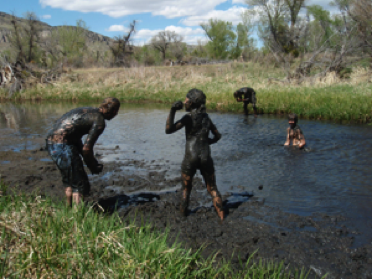
“I splashed Britt, and she splashed me. Next thing Britt knew, a mud ball hit her in the back. She picked up mud and threw it at me. Then we went back to work for a little while. Jon walked up to see what we were doing. Again, a mud ball hit Britt in the stomach. She ran up the trail a bit towards Jon and then threw a ball at me, but missed. ‘Splat!’ right on Jon’s back. Now we were all throwing mud and smiling and laughing. We later walked back to camp, talking and laughing about the memory we had just made.” –Alecia P.
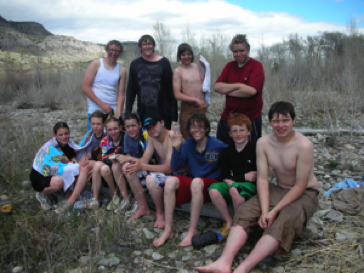
“For three whole days, we were shut off from the TVs, the iPods, and even the world famous cell phone. It is hard to believe, even now, that we could survive without these advances. Now, new things can replace this “junk” that has taken over our lives. Instead of watching TV, we can play the real live video game of marshmallow wars, instead of being stuck on a couch with a joystick in hand.”
--Britt C.
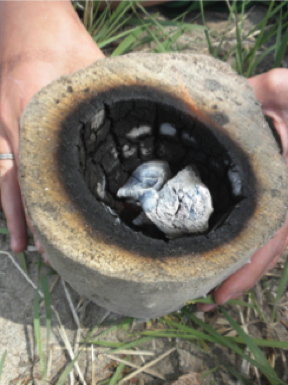
“Before the campout, I always had my nose buried in some fantasy that takes me away from the real world. Now, when I am reading a fantasy, I tend to catch myself looking out the window, longing to go for a walk. When I find myself doing this, I mark my place, grab a jacket, let my mom know I am leaving, and I walk out the door.” –Michaela J.
“My most meaningful experience from the outdoor campout was sitting around the campfire eating delicious s’mores. The starry night was so perfect and beautiful. I could just feel the world falling asleep. Also, hearing the great stories people had to tell made the night even better. The stories expressed how the camper was feeling. I could see and hear that everyone was having fun.” –Taya D.
“To me, the lighting of my torch meant how bright my future will, or will not, be. My torch burned long and steady. To me, that means my future will be happy for a long time.” – Michaela J.
“The outdoor classroom experience has given me a more in-depth look at nature and our ancestors than any movie or text book has or ever will. Living in the outdoors has shown me that nature is full of surprises and that it provides everything that we need to survive. If more schools took their students on outdoor trips like we do, humans might learn to be more conservative and save our world.” --Spencer O.
Outdoor Wilderness Living School, LLC
OWLSchool • PO Box 697 • Pony, MT 59747 • 406-533-5476 • OWLS Email
